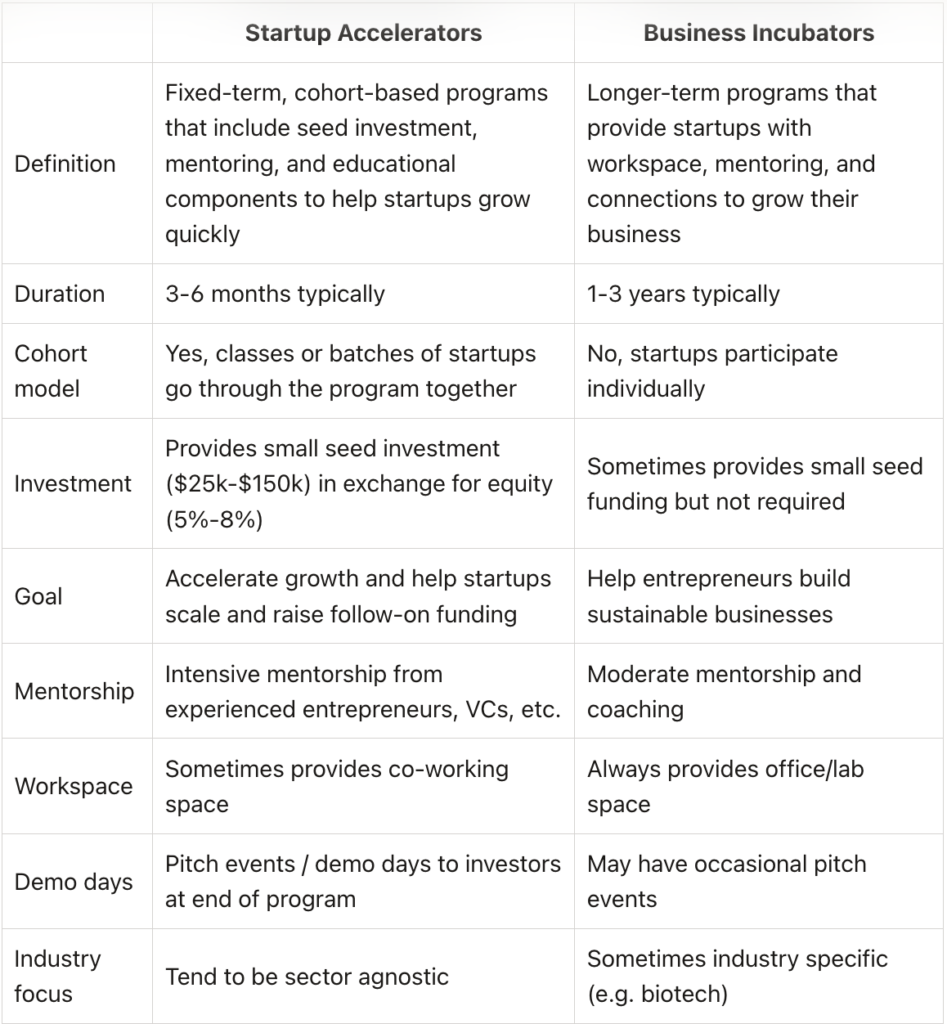Startup accelerators vs incubators with examples
A startup incubator is a program that helps a startup company to develop by providing resources and support.
An accelerator is a program that helps a startup company to grow rapidly by providing funding, mentorship, and resources.
What is a startup incubator?
A startup incubator is a program designed to support the development of early-stage businesses. The incubator provides resources such as office space, mentorship, and access to capital. The goal of the incubator is to help startups grow and succeed.
Startup incubators have become increasingly popular in recent years. They provide a supportive environment for entrepreneurs as they navigate the early stages of starting a business. The resources and mentorship offered by an incubator can be invaluable to a young startup.
If you are thinking about starting a business, consider applying to a startup incubator. The support and resources they provide can be essential to your success.
What is a startup accelerator?
A startup accelerator is a program that provides resources and guidance to help new businesses grow and succeed. These programs typically offer access to funding, mentorship, office space, and other resources that can give startups a boost.
Accelerators can be a great way for startups to get off the ground and make progress toward their goals.
By providing access to funding and mentorship, accelerators can help startups overcome some of the early challenges that they face.
Additionally, the structure and support that accelerators offer can give startups the tools they need to grow and scale successfully.
What is the difference between an accelerator & incubator?
An accelerator and an incubator are both types of programs that provide support to early-stage businesses, but they differ in their focus and the services they offer. Here are five key differences between accelerators and incubators:
- Stage of development: Accelerators typically work with businesses that are further along in their development and have a functional product or service. Incubators, on the other hand, often work with businesses that are in the early stages of development and may not yet have a prototype or a minimum-viable product.
- Duration: Accelerator programs are typically shorter in duration, lasting anywhere from a few weeks to a few months. Incubator programs, on the other hand, can last for several months or even years.
- Structure: Accelerator programs are often structured as cohort-based programs, with a set start and end date and a specific curriculum that participants follow. Incubator programs may be less structured, allowing businesses to work at their own pace and focus on their own specific goals and needs.
- Funding: Accelerators often provide funding to participating businesses in exchange for equity. Incubators may not provide funding, but they may offer in-kind support such as office space, mentorship, and other resources.
- Focus: Accelerators typically focus on helping businesses grow and scale quickly, often through the use of mentorship, networking, and other resources. Incubators may have a broader focus, helping businesses to develop their ideas and build a solid foundation for growth.
What is the purpose of accelerators and incubators?
The purpose of accelerators and incubators is to provide support to early-stage businesses and help them grow and succeed.
Both accelerators and incubators offer resources such as funding, mentorship, and networking opportunities to help businesses develop and achieve their goals.
Accelerators typically work with businesses that are further along in their development and have a functional product or service. The focus of an accelerator is often on helping businesses grow and scale quickly through the use of mentorship, networking, and other resources.
Accelerator programs are typically shorter in duration, lasting anywhere from a few weeks to a few months.
Incubators often work with businesses that are in the early stages of development and may not yet have a prototype or a minimum-viable product. The focus of an incubator is often on helping businesses develop their ideas and build a solid foundation for growth.
Incubator programs can last for several months or even years and may be less structured, allowing businesses to work at their own pace and focus on their own specific goals and needs.
Incubators may not provide funding, but they may offer in-kind support such as office space, mentorship, and other resources.
Examples of accelerators
There are many different accelerator programs available, and they can vary in terms of the industries they focus on, the types of businesses they work with, and the resources they offer. Some accelerators are industry-specific, such as biotech accelerators or fintech accelerators, while others are more general and work with businesses in a variety of sectors.
Examples of accelerator programs include Y Combinator, Techstars, Seedcamp, 500 Startups, and AngelPad.
- Y Combinator: Y Combinator is a startup accelerator based in Silicon Valley. It provides seed funding, mentorship, and resources to early-stage companies. Y Combinator runs two accelerator programs per year, and each program lasts for a few months. Participating companies receive an investment in exchange for equity and receive support to help them grow and scale.
- Techstars: Techstars is a global network of accelerator programs. It provides seed funding, mentorship, and resources to early-stage companies. Techstars runs several accelerator programs per year, and each program lasts for a few months. Participating companies receive an investment in exchange for equity and receive support to help them grow and scale.
- Seedcamp: Seedcamp is a European accelerator that provides seed funding, mentorship, and resources to early-stage companies. Seedcamp runs several accelerator programs per year, and each program lasts for a few months. Participating companies receive an investment in exchange for equity and receive support to help them grow and scale.
- 500 Startups: 500 Startups is a global accelerator that provides seed funding, mentorship, and resources to early-stage companies. It runs several accelerator programs per year, and each program lasts for a few months. Participating companies receive an investment in exchange for equity and receive support to help them grow and scale.
- AngelPad: AngelPad is an accelerator based in San Francisco that provides seed funding, mentorship, and resources to early-stage companies. It runs several accelerator programs per year, and each program lasts for a few months. Participating companies receive an investment in exchange for equity and receive support to help them grow and scale.
Examples of incubators
Incubators can be formed by a variety of organizations, including business schools, engineering colleges, business associations, and even government agencies.
Business schools and engineering colleges may form incubators to provide support to student entrepreneurs and help them develop their ideas into viable businesses. Business associations may form incubators to support the development of new businesses in a specific industry or region.
Government agencies may form incubators to stimulate economic development and encourage the growth of new businesses in a particular area.
For example, a list of incubators in India can be found here.
Here is a comparison of startup accelerators and incubators in table form:

Difference Between Accelerators and Venture Capital Firms
Here are some of the key differences between startup accelerators and venture capital (VC) firms:
- Accelerators provide small seed investment ($25k-$150k) in exchange for equity (5%-8%). VCs make larger investments ($500k+) for more equity (10%-30%).
- Accelerators have a set timeline (3-6 months) with a cohort model. VCs invest on their own timeline and don’t have a structured program.
- Accelerators focus on very early stage companies just getting started. VCs look for companies with some traction and a proven concept.
- Accelerators take a small equity stake. VCs take a much larger equity share and often board seats.
- Accelerators provide hands-on mentorship, training and connections. VCs provide funding and advising but not with the same level of hands-on support.
- Accelerators culminate in a demo day for the cohort. VCs invest on their own timeline without a cohort model or demo day.
So in summary, accelerators focus on the earliest stage startups providing mentoring and training, while VCs provide larger amounts of growth capital to more established startups in exchange for equity.




